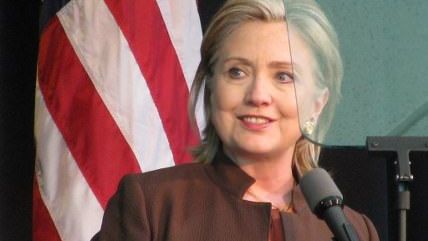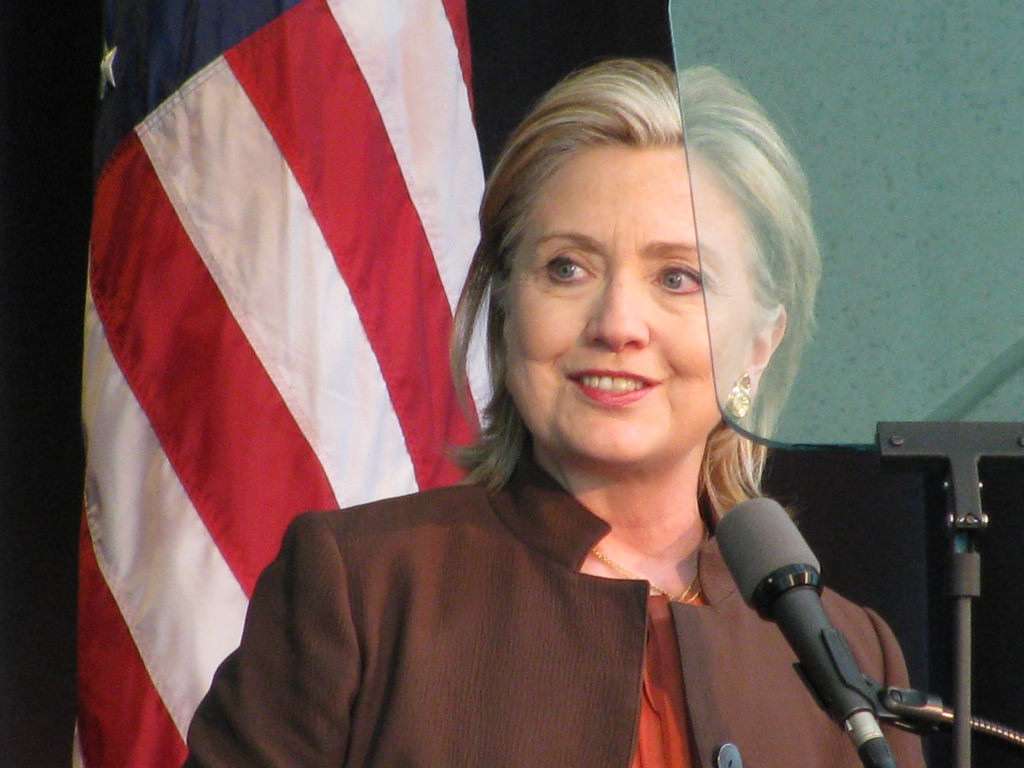In Defense of Hillary Clinton's Lackluster Response on Gay Marriage


Not to beat a quote into the ground that is no doubt going to be beaten all the way into the earth's core and through the other side by the time 2016 comes around, but: What difference, at this point, does it make when exactly Hillary Clinton became a supporter of same-sex marriage recognition?
For the unaware, Clinton participated in a mostly friendly interview with Terry Gross at NPR that got a little tense once Gross tried to pin Clinton down on when she "evolved" to support gay marriage, wondering if perhaps the former secretary of state had essentially actually believed in gay marriage recognition for a while, but couldn't declare her support because it was a politically problematic position for a very long time. From the transcripts of the interview:
GROSS: So you mentioned that you believe in state-by-state for gay marriage, but it's the Supreme Court, too. The Supreme Court struck down part of DOMA - the Defense of Marriage Act, which prevented the federal government from recognizing gay marriage. That part is now struck down. And DOMA was actually signed by your husband when he was president. In spite of the fact that he signed it, were you glad at this point that the Supreme Court struck some of it down?
CLINTON: Of course. And, you know, again, let's - we are living at a time when this extraordinary change is occurring and I'm proud of our country. I'm proud of the people who had been on the frontlines of advocacy, but in 1993, that was not the case and there was a very concerted effort in the Congress to, you know, make it even more difficult and greater discrimination. And what DOMA did is at least allow the states to act. It wasn't going yet to be recognized by the federal government, but at the state level there was the opportunity. And my husband, you know, was the first to say that, you know, the political circumstances, the threats that were trying to be alleviated by the passage of DOMA thankfully were no longer so preeminent and we could keep moving forward, and that's what we're doing.
GROSS: So just to clarify - just one more question on this - would you say your view evolved since the '90s or that the American public evolved allowing you to state your real view?
CLINTON: I think I'm an American. (Laughing) And I think we have all evolved and it's been one of the fastest most sweeping transformations.
GROSS: No, I understand, but a lot of people already believed in it back the '90s. A lot of people already supported gay marriage.
CLINTON: But not - to be fair, Terry, not that many. Yes, were there activists who were ahead of their time? Well, that was true in every human rights and civil rights movement, but the vast majority of Americans were just waking up to this issue and beginning to, you know, think about it and grasp it for the first time. And, you know, think about their neighbor down the street who deserved to have the same rights as they did or their son or their daughter. It has been an extraordinarily fast - by historic terms - social, political and legal transformation. And we ought to celebrate that instead of plowing old ground, where in fact a lot of people, the vast majority of people, have been moving forward - maybe slowly, maybe tentatively, maybe not as quickly and extensively as many would have hoped, but nevertheless we are at a point now where equality, including marriage equality, in our country, is solidly established.
This went back and forth for a bit, with Gross trying to pin Clinton down to saying whether she actually "evolved" or whether she couldn't say so. Clinton kept pointing out that America as a whole has evolved (and rather quickly) on gay marriage and said that it's not true that she held her tongue on gay marriage because of political considerations.
Clinton could no doubt have handled the situation better (Peter Suderman took note yesterday of Clinton's struggles to campaign on her record rather than just her identity), and her awkward responses drew analysis. Nate Silver over at FiveThirtyEight, in his own particular style, analyzed exit poll data and determined that women with Clinton's background had reached majority support for gay marriage all the way back in the early '90s, during the time when her husband was president and signed the Defense of Marriage Act (DOMA). Clinton declared her support for gay marriage recognition in 2013, after President Barack Obama's "evolution," all of which happened after polls began showing consistent majority support for same-sex marriage recognition by all Americans. Essentially, Silver is saying that Clinton was an outlier among her own peers if she truly didn't support same-sex marriage until recently.
Andrew Sullivan, infamously no fan of the Clintons, is actually friendlier than I expected him to be when asked if he could see himself supporting her as a candidate, though he hits the same point as Suderman that she doesn't seem to be actually offering a sense of what she'd do as president and hits back at progressives who want to portray her as some sort of important ally or savior on gay issues. That attitude is a little amusing given that he notably gave President Barack Obama a pass in his Newsweek piece when the president declared support for gay marriage recognition once the polls made it clear it was politically safe to do so.
I dread the idea that any upcoming election could revolve around who supported gay marriage first and when and whether they were sincere. The idea that American politicians are actually "leaders," especially on cultural issues, is a persistent myth. There are very few "pioneers" among politicians on gay issues beyond those who are actually gay. The rest have, like Clinton and Obama, been playing catch up with the polls. They always have been and they always will.
Clinton was also criticized for declaring support for a state-by-state march toward gay marriage recognition by those who worship at the altar of centralized authority. Most gay activist groups are pushing for a Supreme Court decision on gay marriage, hence all the federal lawsuits in the wake of the DOMA ruling trying to push for a new review.
But anybody who thinks that the Supreme Court is some sort of "leader" on civil rights issues is as misguided as anybody who thinks similarly about politicians. Yes, DOMA was a response to gay marriage recognition movements by some states, but does anybody actually, seriously believe DOMA would have been struck down if it had come before the Supreme Court, say, a year after its passing, regardless of the court's makeup? Does anybody really think that the increase in the number of states legalizing recognition was irrelevant to the court's decision?
Since so many of these new federal rulings supporting gay marriage recognition invoke the Supreme Court's Loving v. Virginia decision banning laws against mixed-race marriages, a reminder: That ruling came years after many states began striking down the laws on their own and three years after the passage of the Civil Rights Act of 1964 (also after previous Supreme Court rulings upheld anti-miscegenation laws). The Supreme Court doesn't lead either. To the extent that the Supreme Court makes rulings that expand liberty, they've done so following significant cultural pushes likewise. They may not acknowledge these pushes in their rulings, but it's remarkably foolish to think that these smaller victories don't have huge influences on these decisions.
The details of how or when or how sincere Clinton's positions on gay marriage are in the now is not particularly compelling (he says, after 1,200 words). It's only an indicator that, yes, Hillary Clinton is a politician, and we already knew that. There is nothing particular special or noteworthy for her failure to lead the way. That's not what politicians are for. Clinton has given us 99 reasons not to vote for her, but this ain't one.


Show Comments (81)